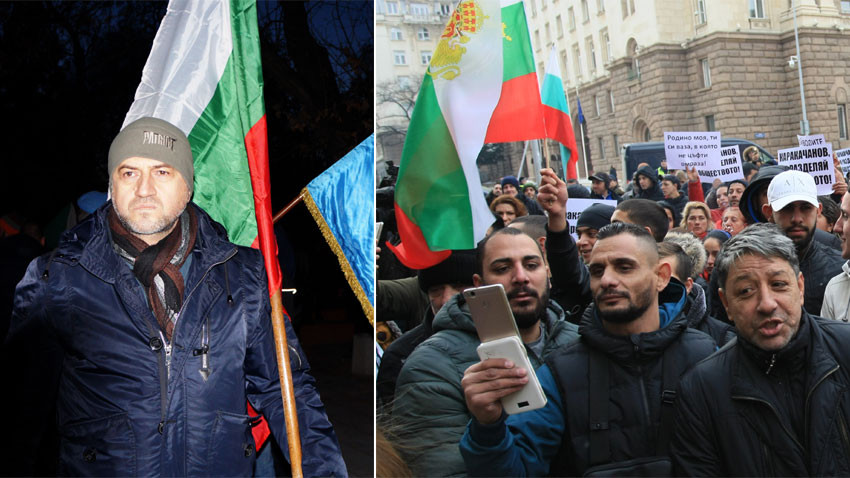
Over the past few days public attention has been focused on the bickering over road construction, the acquisition of new fighter aircraft for the Bulgarian air forces and a string of other issues, yet, another controversy has loomed large, connected with the Roma. And once again it comes at a time of fast approaching elections, as if specifically to corroborate the presumption that the Roma problem is an instrument political forces wield for their own political ends.
After decades of efforts to resolve it, the problem obviously remains unsolved. And that is a dangerous thing, judging by the speed with which an isolated occurrence in a small village far from Sofia grew into a dispute of national proportions, was politicized and escalated into a demonstration in front of the Council of Ministers building with demands for the resignation of Deputy-Prime Minister and Minister of Defence Krasimir Karakachanov.
The indignation of the Roma was caused by Minister Karakachanov’s caustic words, as he commented the assault on an army man by two young men of Roma origin from Voivodinovo village. He said “Gypsies in Bulgaria have grown exceedingly insolent and the tolerance of Bulgarian society has worn thin,” and after this statement, the village mayor gave instructions for the demolition of the illegally-built Roma houses in the village. There followed protests, typical in cases such as this – by the Roma, and counter-protests as a show of solidarity with the defence minister. These were followed by comments and analyses by observers, political analysts and social anthropologists, an indication that it is a problem society is highly sensitive to.
But, as has happened before, the outburst of indignation has, once again, been contained. The protests in Voivodinovo stopped in anticipation of the expiration of the deadline for contestation of the demolition of the houses. The two young men of Roma origin arrested for assault on the soldier will probably also contest the charges, the soldier is making a successful recovery. One more Roma-connected conflict has been quelled, but the causes that led up to it remain.
One of them is that the ethnic group continues to be unintegrated into society. Efforts to integrate them have gone on for decades, including under the “National action plan – decade of Roma inclusion 2005-2015”, part of an international initiative aimed at Roma integration. The various councils, centres, committees, interdepartmental groups set up under this initiative have evidently been inefficient. Now Minister Karakachanov, who is a member of the cabinet as a representative of the junior coalition partner United Patriots, is advocating a comprehensive programme to solve the Roma problem. His personal opinion is that the only way to integrate the Roma efficiently is to include them in the processes of education and labour, an opinion many support. A Barometer Bulgaria survey conducted a few days ago shows that Karakachanov’s views are approved by 73 percent of the respondents, far more than the electorate of the United Patriots. No more than 12.1 percent uphold the opposite view.
A solution to the problem will not be found by going to extremes, it will take patience and will mean avoiding the temptation of politicization. Whether the political forces in the country agree with the latter is something we shall see on the election trail, with elections for European Parliament and local elections coming up this year.
Edited and translated by: Milena Daynova
"Thracians, Wine and Culture" is the theme of a seminar at the archaeological complex "Valley of the Thracian Kings" near Kazanlak , which brings together scholars and researchers from all over Bulgaria on February 22. This is the ninth edition of..
Help me do it myself, get me in touch with nature, take care of my immunity – these are the principles that the teachers at the Bulgarian kindergarten "Hristo Botev" in the Slovak capital Bratislava follow. The kindergarten has been operating since 2009..
"The place in France where we draw together the future of our children in Bulgarian" - this is how Yaneta Dimitrova described her workplace - the Bulgarian Sunday School "Ivan Vazov" in Paris a year ago in a post on a social network. It is one of the 396..
Prayer served by His Holiness Bulgarian Patriarch Daniil on February 22, marks the beginning of the celebrations for the consecration of..
In the era of increased digitalization and the penetration of artificial intelligence into all spheres of our lives, the professions of people with high..
"Thracians, Wine and Culture" is the theme of a seminar at the archaeological complex "Valley of the Thracian Kings" near Kazanlak , which brings..

+359 2 9336 661
